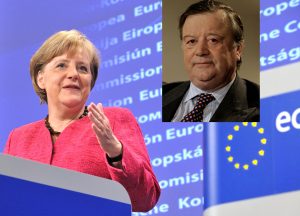
I finished a recent blog post by saying that what we need now is wise leadership. Those words are haunting me. Doubtless there are some who want a leader to push Brexit through as fast as possible, and others who want a leader to stop it. We need something different. I am mentally contrasting the stereotype of the fascist leader, who whips up the darkest desires of the crowd, and the wise leader who enables people to be heard so that wisdom emerges rather than fear and mudslinging.
What prompts me to use the word “fascist” is Christina Wieland’s brilliant book The fascist state of mind and the manufacturing of masculinity. Her suggestion is that the fascist mentality is a reaction to frightening situations, when some very primitive ways of functioning from the very earliest stages of mental life come to the surface. In that place people feel a deep identification with the leader, who makes everything feel good — think of Donald Trump’s followers saying “he tells it like it is”, or the Leave campaign’s “take back control”. Both phrases are meaningless. Their significance is in the emotions they evoke: there is nothing to turn into policy. Other aspects of that stage of mental life include struggles to see difference and to see the big picture. That sounds like the blaming of “immigrants” and “elites” and conspicuous failure to engage with the realities of the EU or of the things that mean people feel left behind.
Brexit seems to have paralysed much of our political process. With the honourable exceptions of the Lords’ Europe Committee and the Liberal Democrats, the discussion seems to be around following/frustrating “the will of the people”, and about wild and ungrounded optimism colliding with increasingly dire warmings of the damage being done. This is so disconnected from reality that it is harmful to democracy.
A textbook psychoanalytic response is that that very primitive way of being belongs to very early childhood, and more nuanced ways develop later. Wise leadership is about moving into this later space, which enables debate (because it can recognise difference) and can form an understanding of the big picture. That’s also a healthier perspective from which to approach something as complex as the EU in a globalised world.
This means a much bigger vision than narrow party interest. It is the opposite of Jeremy Corbyn banging a eurosceptic drum to avoid losing Labour voters to UKIP, or Theresa May’s struggles to keep faith with the europhile and eurosceptic sides of her party, as if afraid of the latter. It means:
- engaging with the real feelings of loss and disconnection that led people to vote Leave;
- talking much more realistically of the EU, so that it is not blamed for everything that is wrong, but can be part of the solution;
- recognise that EU reform is needed, not because the EU is “bad” but because the world is changing, and the EU needs to adapt, particularly to take account of the growing might of China and India, and soon-to-be President Trump being a much less credible leader than Obama.
This needs someone of the exceptional calibre of Shirley Williams or Kenneth Clarke. The situation is urgent. There is not time for a General Election to change the parliamentary arithmetic, so this almost certainly means someone emerging in the Conservative party.
From a Liberal Democrat perspective, with only nine MPs, we can’t supply a new Prime Minister, but we can help to shift the discussion to the actual issues, in a way that does help wise leadership to emerge. Although the national interest in not blundering out of the EU needs to come first, being the voice of wisdom won’t harm our electoral chances when the time comes.
Originally published on Liberal Democrat Voice
This is very important. To add a little to your analysis, as I have said elsewhere, nowhere is there any appreciation of the mythology with which we have all grown up about our national identity. My favourite example of how significant this is is the choice of Flower of Scotland as the alternative National Anthem for Scotland….a modern ballad which looks back to Bannockburn as the defining moment in history. I have lived in the Highlands (and am of Scottish roots)and i know the truth this represents….add Flodden, 1745 et al, the Highland Clearances….; and what is true of Scotland can equally be said of England….1066, the Crusades, Elizabeth 1st and the growth of Imperialism….plucky little England standing against Napoleon, Hitler,…and still believing we should and could rule the world….Unless we understand this mythology and find ways of countering it…partly through wise leadership definitely…..we are going to get into more and more difficult waters.
Yes — I picked up some of this a little while back around the legacy of the Second World War and how inaccurate stories of then are distorting the narrative over the EU now: http://www.markargent.com/blog/chosen-trauma-memories-war/